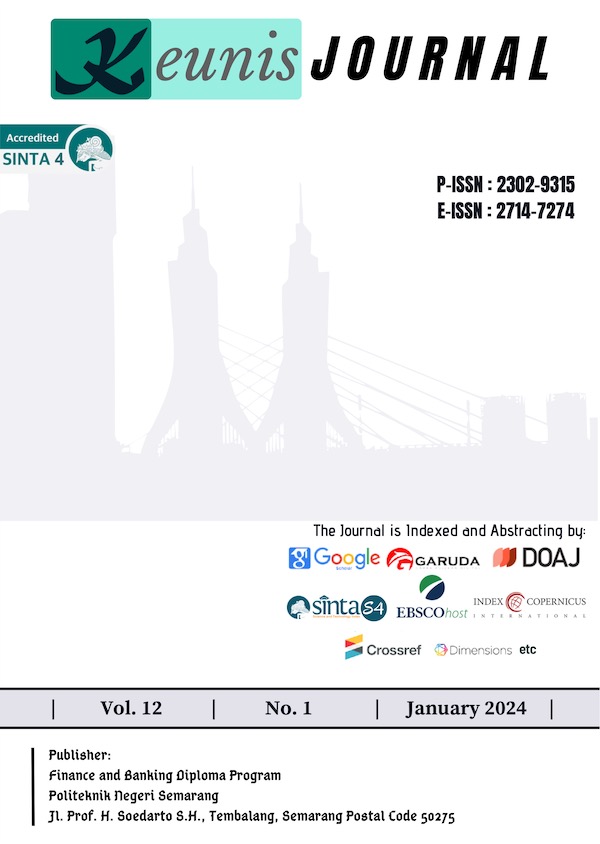DETERMINANTS OF GREEN LIFESTYLE FACTORS TO MAINTAIN THE SUSTAINABILITY OF ENVIRONMENTAL TOURISM BUSINESS
DOI:
https://doi.org/10.32497/keunis.v12i1.5059Keywords:
SME”™s Performance, Product Innovation, Transformational Leadership, Entrepreneur Orientation, SME'sAbstract
Based on interviews with tourism object managers, it was found that generation z tourists often take disgraceful actions by displaying behavior that pollutes and even damages tourist attractions. This study examines how much influence (tourist attitudes, subjective norms, expected behavioral control on tourist intentions), then examines the effect of tourist intentions on environmentally responsible tourism behavior and examines its effect on green lifestyles. This research is a type of quantitative research and primary data source. The population of this study is Generation Z tourists who have visited in the last three years. The samples obtained were 224 respondents. The data analysis technique in this study uses the Warp PLS (Partial Least Square) structural equation model. The results show that all hypotheses are accepted. Attitude, Subjective Norm, and Behavioral control that is felt to affect intentions. The higher the tourists' intention to be responsible for the environment, the better the behavior responsible for the environment. The results show that the better the behavior to be responsible for the environment, the higher the green lifestyle. With this research, it is hoped that it can raise awareness for the younger generation to be more concerned about environmental sustainability around tourism sites and participate in preserving the environmentReferences
Ahmad, F., Draz, M. U., Su, L., Ozturk, I., & Rauf, A. (2018). Tourism and environmental pollution: Evidence from the One Belt One Road provinces of Western China. Sustainability (Switzerland), 10(10), 1”“23. https://doi.org/10.3390/su10103520
Ajzen, I. (1991). The Theory of Planned Behavior. Organizational Behavior and Human Decision Processes, 50, 179”“211. https://doi.org/10.1080/10410236.2018.1493416
Asmelash, A. G., & Kumar, S. (2019). Assessing progress of tourism sustainability: Developing and validating sustainability indicators. Tourism Management, 71(September 2018), 67”“83. https://doi.org/10.1016/j.tourman.2018.09.020
Brown, T. J., Ham, S. H., & Hughes, M. (2010). Picking up litter: An application of theory-based communication to influence tourist behaviour in protected areas. Journal of Sustainable Tourism, 18(7), 879”“900. https://doi.org/10.1080/09669581003721281
Chen, M. F., & Tung, P. J. (2014). Developing an extended Theory of Planned Behavior model to predict consumers”™ intention to visit green hotels. International Journal of Hospitality Management, 36, 221”“230. https://doi.org/10.1016/j.ijhm.2013.09.006
Chwialkowska, A. (2019). How sustainability influencers drive green lifestyle adoption on social media: The process of green lifestyle adoption. Management of Sustainable Development, 11(1), 33”“43.
Florenthal, B., & Arling, P. (2011). Do Green Lifestyle Consumers Appreciate Low Involvement Green Products? Marketing Management Journal, 21(2), 35.
Genoveva, G., & Syahrivar, J. (2020). Green Lifestyle among Indonesian Millennials: A Comparative Study between Asia and Europe. Journal of Environmental Accounting and Management, 8(4), 397”“413. https://doi.org/10.5890/jeam.2020.12.007
Hair, J., Hult, T., Ringle, C., & Sartstedt, M. (2013). A Primer on Partial Least Squares Structural Equation Modelling (LPS-SEM).
Han, H., & Kim, Y. (2010). An investigation of green hotel customers”™ decision formation: Developing an extended model of the theory of planned behavior. International Journal of Hospitality Management, 29(4), 659”“668. https://doi.org/10.1016/j.ijhm.2010.01.001
Han, H., Lee, S., Al-Ansi, A., Kim, H. C., Ryu, H. B., Kim, J. J., & Kim, W. (2019). Convention tourism and sustainability: Exploring influencing factors on delegate green behavior that reduce environmental impacts. Sustainability (Switzerland), 11(14). https://doi.org/10.3390/su11143903
Hill, J., & Gale, T. (2012). Ecotourism and environmental sustainability: An introduction. In Ecotourism and Environmental Sustainability: Principles and Practice.
Hu, R., Chen, L., & Zheng, L. (2018). Congestion pricing and environmental cost at Guangzhou Baiyun International Airport. Journal of Air Transport Management, 70, 126”“132. https://doi.org/10.1016/j.jairtraman.2018.04.016
Ibnou-Laaroussi, S., Rjoub, H., & Wong, W. K. (2020). Sustainability of green tourism among international tourists and its influence on the achievement of green environment: Evidence from North Cyprus. Sustainability (Switzerland), 12(14), 1”“24. https://doi.org/10.3390/su12145698
Line, N. D., Hanks, L., & Miao, L. (2018). Image Matters: Incentivizing Green Tourism Behavior. Journal of Travel Research, 57(3), 296”“309. https://doi.org/10.1177/0047287517697848
Liu, A., Ma, E., Qu, H., & Ryan, B. (2020). Daily green behavior as an antecedent and a moderator for visitors”™ pro-environmental behaviors. Journal of Sustainable Tourism, 28(9), 1390”“1408. https://doi.org/10.1080/09669582.2020.1741598
Miller, D., Merrilees, B., & Coghlan, A. (2015). Sustainable urban tourism: understanding and developing visitor pro-environmental behaviours. Journal of Sustainable Tourism, 23(1), 26”“46. https://doi.org/10.1080/09669582.2014.912219
Sholihin, M., & Ratmono, D. (2013). Analisis SEM-PLS dengan WarpPLS 3.0 untuk Hubungan Nonlinier dalam Penelitian Sosial dan Bisnis.
Singh, N., Cranage, D. A., & Nath, A. (2014). Estimation of GHG emission from hotel industry. Anatolia, 25(1), 39”“48. https://doi.org/10.1080/13032917.2013.822817
Thøgersen, J. (2006). Norms for environmentally responsible behaviour: An extended taxonomy. Journal of Environmental Psychology, 26(4), 247”“261. https://doi.org/10.1016/j.jenvp.2006.09.004
Wang, C., Zhang, J., Cao, J., Hu, H., & Yu, P. (2019). The influence of environmental background on tourists”™ environmentally responsible behaviour. Journal of Environmental Management, 231(August 2018), 804”“810. https://doi.org/10.1016/j.jenvman.2018.10.089
Wang, P., Liu, Q., & Qi, Y. (2014). Factors influencing sustainable consumption behaviors: A survey of the rural residents in China. Journal of Cleaner Production, 63, 152”“165. https://doi.org/10.1016/j.jclepro.2013.05.007
Yu, C. P., Chancellor, H. C., & Cole, S. T. (2011). Measuring residents”™ attitudes toward sustainable tourism: A reexamination of the sustainable tourism attitude scale. Journal of Travel Research, 50(1), 57”“63. https://doi.org/10.1177/0047287509353189
Zsóka, Ã., Szerényi, Z. M., Széchy, A., & Kocsis, T. (2013). Greening due to environmental education? Environmental knowledge, attitudes, consumer behavior and everyday pro-environmental activities of Hungarian high school and university students. Journal of Cleaner Production, 48, 126”“138. https://doi.org/10.1016/j.jclepro.2012.11.030
Downloads
Published
How to Cite
Issue
Section
License
KEUNIS is licensed under a Creative Commons Attribution-ShareAlike 4.0 International License.
Authors who publish with this journal agree to the following terms:
- Authors retain copyright and grant the journal right of first publication with the work simultaneously licensed under a Creative Commons Attribution-ShareAlike 4.0 International License that allows others to share the work with an acknowledgement of the work's authorship and initial publication in this journal.
- Authors are able to enter into separate, additional contractual arrangements for the non-exclusive distribution of the journal's published version of the work (e.g., post it to an institutional repository or publish it in a book), with an acknowledgement of its initial publication in this journal.
- Authors are permitted and encouraged to post their work online (e.g., in institutional repositories or on their website) prior to and during the submission process, as it can lead to productive exchanges, as well as earlier and greater citation of published work (See The Effect of Open Access).






